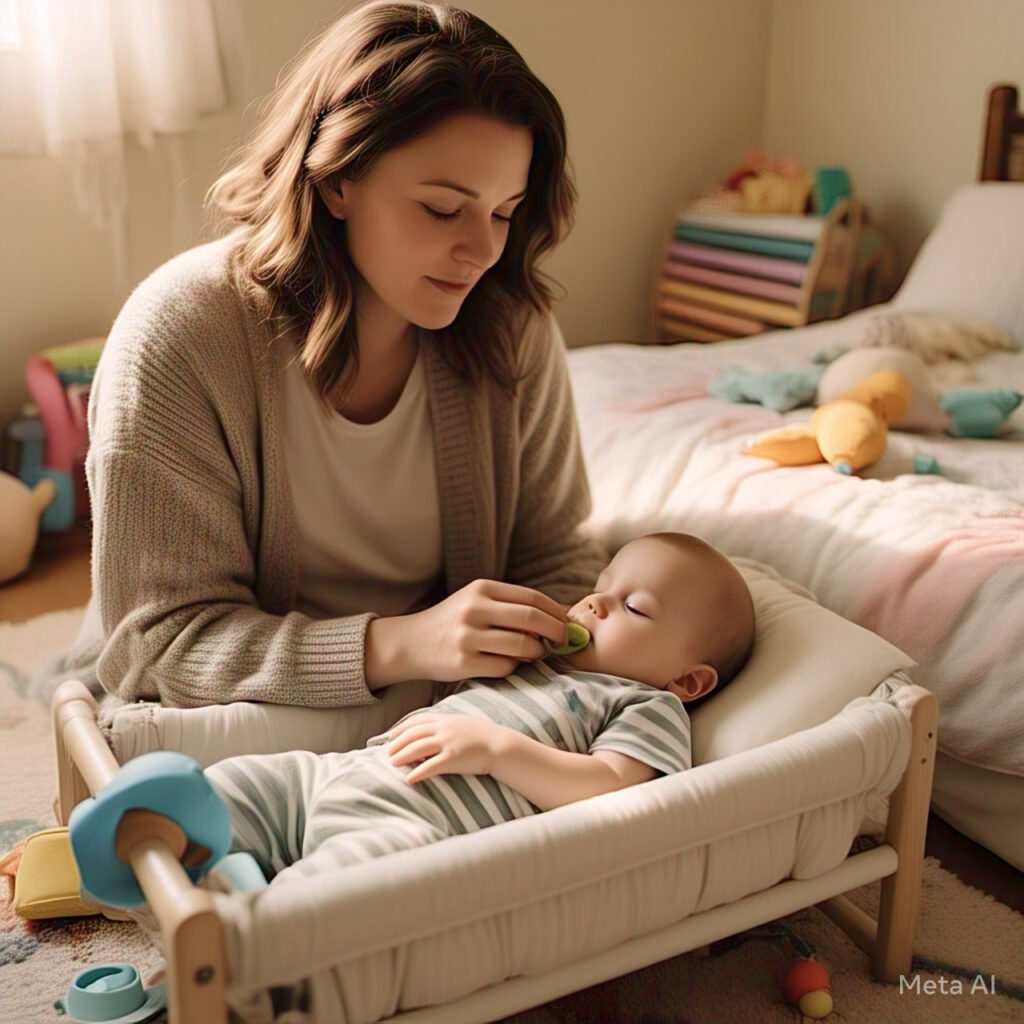Introduction
Can newborns have bad dreams? Parents often wonder if their newborns cry at night because of bad dreams. However, according to a study published in the Journal of Pediatrics and Child Health by Harriet Hiscock and Margot J. Davy, there is no clear evidence that babies have nightmares. Since they cannot talk, it is difficult to know if they are having bad dreams.

However, crying during sleep can be a way for babies to send signals. It can mean that they are uncomfortable, sick, or experiencing problems such as hunger. Experts suggest that crying during sleep is a normal part of a newborn’s first months of life. If the crying does not stop, it may be associated with a sleep disorder. In such cases, parents should check to see if the baby is too hot, too cold, or needs a diaper change. Some babies also show sudden movements in their first or second year, but this does not mean that nightmares are the cause. Rather, it is simply their brain developing.
What are dreams?
To understand whether newborns can have nightmares, we first need to understand what dreams are. Dreams are thought to be the result of brain activity during sleep, which is influenced by memories, emotions, and experiences.
Table of Contents
The key elements of dreaming:
- The brain processes information gathered during the day.
- Emotional responses and experiences shape the content of dreams
- Creating complex dream scenes involves higher cognitive functioning.
However, newborns lack the advanced cognitive abilities necessary to recall past experiences, create fears, or process emotional memories in a way that leads to nightmares. But that doesn’t mean they don’t dream at all.
Can newborns have nightmares?
A nightmare is a distressing dream that causes feelings of fear, anxiety, or sadness. To have a nightmare, the dreamer must have the cognitive ability to create a frightening situation and process the emotions, otherwise, they cannot have a nightmare.
Why don’t newborns have Nightmares?
- Limited emotional memory: Newborns have not yet developed the complex emotional connections necessary for nightmares.
- Undeveloped fear response: Fear is a learned response, and newborns are not yet able to experience fear-driven thoughts.
- Lack of storytelling ability: Nightmares often involve imaginary scenes, but newborns lack the cognitive function to create such narratives.
However, infants experience sleep disturbances that may seem like nightmares to parents, such as sudden crying or squirming during sleep. But these reactions are often part of normal newborn sleep patterns.
Why do babies cry in their sleep?
Hearing a newborn cry in their sleep can be alarming, but it’s usually not caused by a bad dream. Rather, it can be caused by a variety of physiological or developmental factors. Here are some common reasons why newborns cry in their sleep.
- Sleep changes: Babies frequently cycle between light and deep sleep, sometimes waking up partially and making noises before settling down again.
- Hunger or discomfort: Newborns often wake up because they need to be fed, have a diaper change, or feel too hot or cold.
- Digestive discomfort: Gas, reflux, or an immature digestive system can cause discomfort, which can lead to noises at night.
- Startle reflex: The Moro reflex, a normal newborn reflex, can cause sudden movements that wake a baby.
Since crying is a newborn’s primary way of communicating, it’s natural for them to express any discomfort they may have – even during sleep.
Why does my baby scream and wake up crying?
Many parents are concerned when their newborn baby wakes up crying and screaming at night. It’s natural to think that bad dreams are the cause, but research has shown that babies may not experience nightmares or night terrors like older children and preschoolers. Because their brains are still developing, they may not be able to describe what they are feeling. However, sudden movements, temperature changes, or digestive problems can make them uncomfortable during sleep.

During the first few months, babies go through two types of sleep cycles: REM and non-REM. Dreaming occurs most often during the REM stage, where the eyes move in different directions but do not send visual information to the brain. Non-REM stage is the deepest stage of sleep. If a baby suddenly wakes up and cries uncontrollably, it may not be because of a bad dream but rather because of a sleep disturbance. Some babies breathe rapidly, shake, or sweat profusely at night, which can worry parents.
If your baby is having trouble falling back to sleep, you can try holding them and comforting them. However, some may push you away and not immediately recognize you, which can be worrisome. This is sometimes associated with parasomnias, which include night terrors, talking during sleep, and other disruptive behaviors. If these episodes occur early in sleep and start frequently, it’s a good idea to monitor the patterns and consult a doctor if necessary.
Do children experience night terrors?
Night terrors are different from nightmares. They usually occur in older children during non-REM sleep and involve sudden episodes of intense fear or screaming. Unlike nightmares, the child does not fully wake up and often does not remember the episode in the morning.
Are night terrors possible in newborns?
- Unlikely: Night terrors usually begin around 3-4 years of age when the non-REM sleep cycle matures.
- Newborn sleep is different: Because newborns spend a lot of time in REM sleep, they do not experience the deep non-REM sleep associated with night terrors.
So, if a newborn appears restless in their sleep, it is more likely to be due to normal sleep behavior than an actual night terror.
Signs of a Newborn Baby’s Nightmare
Scientifically, newborns do not have nightmares, but parents may notice behaviors during sleep that seem distressing. However, these behaviors are not usually signs of bad dreams but rather normal reflexes or sleep-related movements.
Common sleep behaviors that may be mistaken for nightmares:
- Flickering or shaking: These are natural reflexes as the nervous system develops.
- Sudden crying or whimpering: Often caused by hunger, discomfort, or a change in sleep cycle.
- Startle (Moro reflex): Newborns’ built-in startle reflex may make it seem like they are frightened in their sleep.
Unless a baby wakes up crying and appears helpless, parents usually don’t need to worry about nightmares or bad dreams.
How to Calm a Restless Newborn in Their Sleep
If a newborn seems restless or cries in their sleep, there are some gentle ways to comfort them without waking them up completely.
Tips for calming a sleeping baby:
- Gentle touch: Placing a hand on the chest or gently stroking the head can be reassuring.
- Soothing sounds: White noise or gentle, soothing sounds can mimic the sounds of the womb and help them settle.
- Sodding: Holding a baby tightly can prevent the Moro reflex from waking them.
- Rocking or holding: A slow, rhythmic motion can calm a restless newborn.
- Check for discomfort: Make sure the baby is not too hot, too cold, hungry, or needs a diaper change.
Since newborns cry for many reasons, responding with patience and gentle reassurance can help them return to a peaceful sleep.
Parental Concerns About Baby’s Sleep and Dreams
There are many myths about baby sleep and nightmares that can lead to unnecessary worry. Understanding the science behind newborn sleep can help parents feel more confident about their baby’s nighttime habits.

Common myths about baby sleep and nightmares:
- If a baby cries in their sleep, they must be having a nightmare.
They’re likely shifting through their sleep cycle or experiencing normal reflexive movements.
- Babies remember stressful experiences and have bad dreams about them.
Newborns can’t recall the memories needed to create dreams based on past events.
- Sleep training can prevent nightmares.
Since newborns don’t have nightmares, sleep training is more about establishing good sleep habits than stopping bad dreams. Understanding what’s normal about baby sleep can help parents avoid unnecessary stress and focus on healthy sleep practices.
How to Improve Your Baby’s Sleep Quality
Although newborns wake up frequently due to their developmental needs, creating a consistent sleep routine can create opportunities for both baby and the parents to get a good night’s rest.
Best practices for good newborn sleep:
- Establish a nighttime routine: Even simple tasks like dimming the lights, playing soft music, or taking a warm bath can signal bedtime.
- Encourage daytime wakefulness: Natural light and interactive play during the day can help regulate sleep patterns.
- Create a calm sleep environment: A quiet, dark, and comfortable space encourages uninterrupted sleep.
- Practice safe sleep guidelines: Always place babies on their backs to sleep and keep the crib free of blankets and toys.
Although newborns naturally have irregular sleep cycles, consistency in routine can help them develop better sleep habits over time.
What to do if your baby wakes up suddenly
Here are some things you can try if your baby wakes up suddenly
- Pause and observe: Sometimes, babies fuss for a while and then go back to sleep on their own.
- Check basic needs: Make sure the baby is not hungry, wet, or uncomfortable.
- Provide gentle comfort: Use gentle pats, rocking, or a pacifier if needed.
- Avoid overstimulation: Keeping lights low and avoiding sudden noises can help maintain a sleepy environment.
FAQs about Newborns Having Bad Dreams
1. Can newborns see dreams?
Newborns likely experience sensations during sleep but do not have the cognitive ability to form structured dreams.
2. Why does my newborn suddenly cry in their sleep?
This is usually due to sleep transitions, discomfort, or normal reflexes, not bad dreams.
3. When do babies start having real dreams?
Experts believe that toddlers may start dreaming around age 2-3 when their brains develop the ability to recall experiences.
4. How can I tell if my baby is having a nightmare?
Newborns do not have nightmares, but they may cry or startle due to sleep cycles, hunger, or physical discomfort.
5. What should I do if my baby wakes up crying at night?
Check for basic needs like hunger or discomfort, offer gentle reassurance, and avoid overstimulation to help them settle back to sleep.
Conclusion
Although newborns spend a significant amount of time in REM sleep, evidence suggests that they do not experience nightmares because their cognitive and emotional processing abilities are still immature. Crying, shaking, or startling, which may seem like a nightmare, is usually a normal part of newborn sleep development.
Parents can help their baby sleep better by maintaining a calm sleep routine, ensuring a comfortable sleep environment, and responding with gentle reassurance when needed. If sleep disturbances are severe or persistent, consulting a pediatrician can help address any underlying concerns.
Ultimately, newborns may not have bad dreams, but they do need patience, care, and understanding as they navigate their early sleep cycles.
